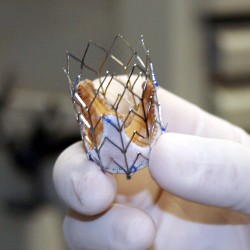The engineering school at University of California in Riverside has received funding for research on alternative materials for medical implants that degrade naturally. National Science Foundation awarded the two-year grant for $175,000 to assistant professor of bioengineering Huinan Liu.
Liu’s research will focus on developing biodegradable medical implant materials that would promote tissue regeneration and disappear after serving their functions in the body. Many of today’s medical implants, used for devices such as coronary stents (pictured right) or to repair a torn ligament, are made with titanium alloys or stainless steel. These metals are permanent, which can lead clinical complications, and eventually to failure.
The university expects the grant to support research on magnesium-based alloys in medical implants, seeking alloys and surfaces which promote tissue growth and degrade naturally in the body before being released through urine. In orthopedics, magnesium-based alloys could repair knee and hip joints, as well as torn ligaments and rotator cuffs. They could be used for stents and grafts in veins or arteries, as well as in facial reconstruction and spinal injuries.
The funding is also expected to support development of a class in tissue engineering at Riverside’s engineering school. The grant will support as well, outreach to local public schools with events on the impact of nanoscience and nanotechnology on health.
Read more: Nanotech Patch Repairs Damaged Heart Tissue in Lab Tests
* * *


 RSS - Posts
RSS - Posts
[…] Read more: Grant to Fund Research on Biodegradable Implant Materials […]